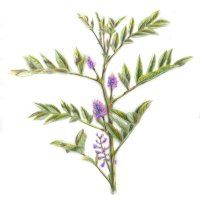When you were a child, did you like the black jelly beans best? Then you will love drinking licorice tea or chewing on a licorice root. At one time, black licorice and other candy was flavored with licorice root extract. Although today licorice candy usually derives its distinctive taste from anise oil, the root is still prized as a flavoring agent and an herbal remedy and is used widely in the ood and health industries. Licorice may be found in the wild, but large crops are farmed to meet the demand for this important botanical.
Uses of Licorice
Licorice is used to treat a vast array of illnesses. In China, licorice is considered a superior balancing or harmonizing agent and is added to numerous herbal formulas. It is used to soothe coughs and reduce inflammation, soothe and heal ulcers and stomach inflammation, control blood sugar, and balance hormones. Licorice is great for healing canker sores and cold sores (herpes simplex virus). Licorice is a potent antiviral agent and can be used to treat flu, herpes, and even hepatitis. Licorice is also a strong anti-inflammatory agent and can be used to improve the flavor of other herbs. With all of these uses, it is no wonder that licorice finds its way into so many therapies.
Advertisement
Several modern studies have demonstrated the ulcer-healing abilities of licorice. Unlike most popular ulcer medications, such as cimetidine, licorice does not dramatically reduce stomach acid; rather, it reduces the ability of stomach acid to damage stomach lining by encouraging digestive mucosal tissues to protect themselves from acid. Licorice enhances mucosal protection by increasing the action of mucous-secreting cells, boosting the life of surface intestinal cells, and increasing microcirculation within the gastrointestinal tract. This improves the health of the stomach lining and reduces damage from stomach acid. One study in Ireland showed a licorice extract to be a better symptom reliever than Tagamet for a number of ulcer patients.
The remarkably sweet saponin glycoside glycyrrhizin is what gives licorice its characteristic flavor. (Glycyrrhizin is 30 to 60 times sweeter than sugar.) Glycyrrhizin is also an anti-inflammatory, and licorice also has been used to treat inflammations of the lungs, bowels, and skin. Glycyrrhizin is one of the constituents found to prolong the length of time that cortisol, one of the adrenal hormones, circulates throughout the body. Among other actions, cortisol reduces inflammation. Anything that prolongs the life of cortisol naturally helps to reduce inflammation.
Many anti-inflammatory drugs are synthetic versions of cortisol. They control conditions such as asthma, arthritis, bowel disease, and eczema by suppressing the immune systems, which halts the body's ability to mount an inflammatory response. Licorice is not thought to suppress the immune system the way pharmaceutical steroids do. Both pharmaceutical cortisones and licorice, however, may cause the same side effects: weight gain, fluid retention, and as a possible result, high blood pressure. Still, if you use cortisone, prednisone, or a similar steroid, you should seek the advice of a naturopathic or other knowledgeable physician to determine whether your condition may be managed another way.Keep reading to learn about warnings and preparations for licorice.To learn more about treating common medical conditions at home, try the following links:
- For an overview of all of our herbal remedies, go to the main Herbal Remedies page.
- To learn more about treating medical conditions at home, visit our main Home Remedies page.
- One of the best things you can do for your health and well being is to make sure you are getting enough of the vital nutrients your body needs. Visit our Vitamins page to learn more.
This information is solely for informational purposes. IT IS NOT INTENDED TO PROVIDE MEDICAL ADVICE. Neither the Editors of Consumer Guide (R), Publications International, Ltd., the author nor publisher take responsibility for any possible consequences from any treatment, procedure, exercise, dietary modification, action or application of medication which results from reading or following the information contained in this information. The publication of this information does not constitute the practice of medicine, and this information does not replace the advice of your physician or other health care provider. Before undertaking any course of treatment, the reader must seek the advice of their physician or other health care provider.Before engaging in any complementary medical technique, including the use of natural or herbal remedies, you should be aware that many of these techniques have not been evaluated in scientific studies. Use of these remedies in connection with over the counter or prescription medications can cause severe adverse reactions. Often, only limited information is available about their safety and effectiveness. Each state and each discipline has its own rules about whether practitioners are required to be professionally licensed. If you plan to visit a practitioner, it is recommended that you choose one who is licensed by a recognized national organization and who abides by the organization's standards. It is always best to speak with your primary health care provider before starting any new therapeutic technique.
Advertisement
